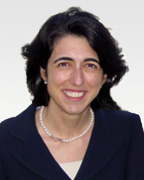UCSF Researchers Reappraise Treatment for Gastroschisis, Shining Light on Role of Immune System

UCSF News reports on the work of a UCSF research team investigating the causes and potential treatments for gastroschisis, a rare disorder in which developing intestines protrude outside of the body through a hole alongside the belly button. Led by pediatric surgeon Tippi MacKenzie, MD, Associate Professor of Surgery in the UCSF Division of Pediatric Surgery and co-Director of the UCSF Center for Maternal-Fetal Precision Medicine, the team published findings elucidating the role of the immune system in the development of this potentially life-threatening disorder.
UC San Francisco researchers have shed light on how the immune system of a fetus can run amok, triggering inflammation in the developing intestines that protrude outside of the body through a hole beside the belly button.
Their findings, published online May 13, 2016, in the Journal of Immunology point to a treatment strategy for the condition known as in gastroschisis, and to the cellular mechanisms within the fetal immune system that may lead to aberrant development.
Gastroschisis is a potentially life-threatening condition occurring in approximately one in 2,000 babies born in the United States, according to the Centers for Disease Control and Prevention (CDC).
Before birth, the fetal immune system develops to a more advanced degree than scientists previously appreciated, according to principal investigator and senior author Tippi MacKenzie, MD, a pediatric surgeon and associate professor in the Department of Surgery at UCSF Benioff Children’s Hospital San Francisco.
“In the past, we had assumed that contact with the amniotic fluid is what causes bowel damage in gastroschisis, but we have now shown that the bowel damage is due to inherent changes in the fetal immune system, which mounts an immune response,” she said. “As a result, our ideas about how we might treat gastroschisis have changed.”
Immune Cells, Signaling Molecules Key to Inflammation
“The current treatment for gastroschisis involves placing the intestines back in the belly and closing the hole,” said MacKenzie, who is co-director of the UCSF Center for Maternal-Fetal Precision Medicine, which develops new therapies for patients with birth defects. “But the intestines remain inflamed, and the neonates are in the intensive care unit for weeks, sometimes months, just waiting for the intestines to recover. We need to understand what causes this inflammation so we can directly treat it.”
Other members of the Department of Surgery contributing to this research include: Qizhi Tang, PhD, Associate Professor of Surgery, Division of Transplant Surgery, and Director of the Transplantation Research Laboratory and Tang Lab, Aras Mattis, MD, PhD, Clinical Fellow, Liver and Gastro-intestinal Pathology, Department of Pathology, and Postdoctoral Fellow in the Willenbring Lab, and Cerine Jeanty, MD, a Chief Resident in the UCSF General Surgery Residency Program and former Research Fellow in the Mackenzie Lab.
Heightened Immune Activation in Fetuses with Gastroschisis May Be Blocked by Targeting IL-5 at Journal of Immunology